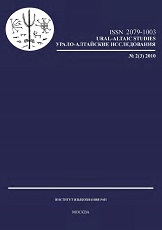Mordvin t-derivatives — the semantic equivalent for the impersonal
Mordvin t-derivatives — the semantic equivalent for the impersonal
Author(s): Merja SaloSubject(s): Language and Literature Studies
Published by: Институт языкознания Российской академии наук
Summary/Abstract: This study reveals new data for the Finnish so called unipersonal (or impersonal) passive representing material from rare, currently almost forgotten t-derivatives in the Mordvin languages, Erzya and Moksha. Examples collected from the high quantity of folklore texts and dictionaries can be divided into the following groups: 1) Automatives: physiological verbs, meteorological verbs, other automatives; 2) Intentionals; 3) Passives; 4) Modals and 5) Lexicalizations. Contemporary speakers use these t verbs mostly to express unpleasant feelings and negative physiological states. The t-derivatives can also be used to describe weather conditions as the only constituent part of a sentence, but this is very marginal. These two types of usage bring the t-derivatives close to the impersonals in Indo-European languages.
Journal: Урало-алтайские исследования
- Issue Year: 2010
- Issue No: 02 (3)
- Page Range: 72-87
- Page Count: 16

